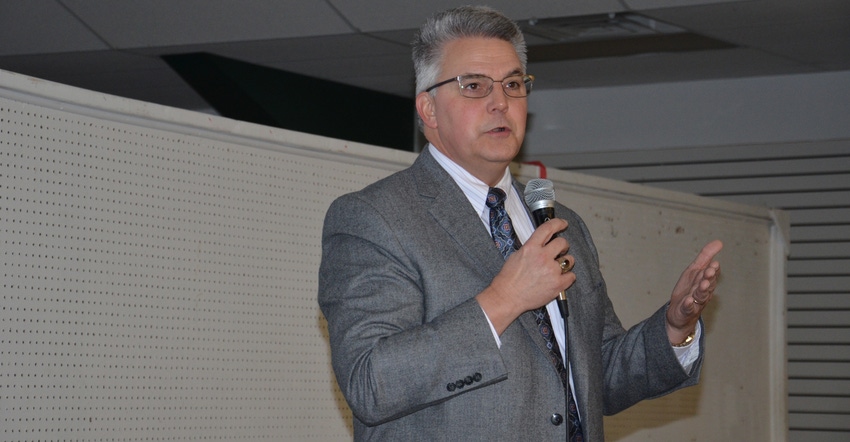March 19, 2018

Improving infrastructure is one of the seven pillars in the strategic plan for moving Indiana agriculture forward. The plan was released during a summit sponsored by the Indiana State Department of Agriculture in June 2017. Since then, there is a new director at ISDA. Bruce Kettler replaced Ted McKinney after McKinney was confirmed by Congress to be the first USDA undersecretary for trade. Kettler immediately embraced the strategic plan and is hard at work monitoring how various people and groups assigned to carry out the plan are functioning.
Infrastructure commanded a good portion of his talk to a group of ag people in Johnson County recently. He also spent time talking about ag education and the need to educate everyone on how it fits into workforce development.
“Infrastructure is roads and bridges, but it is much more than that,” Kettler said. “Broadband access in rural Indiana is a part of it too. Our job is to convince legislators and other leaders that it is about much more than bringing Netflix to rural areas. It’s not about that for us. It’s about what access to high-speed, dependable broadband service can do for farms and the businesses that supply farms.”
The Legislature began addressing broadband access in rural Indiana during the 2018 session. It was one of Indiana Farm Bureau’s top priority issues. More remains to be done.
“People that supply inputs to farmers need access to efficient broadband service, too,” Kettler continued. “It also must extend to schools in rural areas.
“Perhaps one important component to the broadband debate that not many people recognize at first is its impact on the health care industry. Rural hospitals can use it to access information from doctors and researchers around the world if they have it. Efficient, consistent broadband access lifts everyone up in rural communities.”
Ag education issues
One of Kettler’s first mini-crises during his first week on the job was an announcement from the Department of Education that certain agriculture education classes would receive less funding for 2018-19. ISDA has a stake in this arena because the top two positions for the Indiana FFA Association are under the umbrella of ISDA. They work closely with DOE.
The emphasis at the state level when it comes to education is on workforce development. It seems vocational agricultural would be a natural fit to help prepare students for the workplace. Kettler agrees, and believes that in the end it will be an important player.
“The problem is that some people in the workforce development sector didn’t really have a good understanding of career pathways and the role ag education plays,” he explained. “To some, an engineer is an engineer, and they didn’t single out ag engineers, or break it down to ag bioengineers.
“We have people at least talking now. We realize we must be able to show them where ag education fits in the solution.”
One of the courses signaled for the largest cut in funding is advanced plant and soil science, the backbone for someone pursuing a career in agronomy. Coming to ISDA from Beck’s, a seed company steeped in plant research, Kettler is aware that agronomy and plant science are vital, critical career paths today.
“There was a disconnect there,” he said. “We have work to do, and we’re working on solutions.”
Comments? Email [email protected].
You May Also Like




